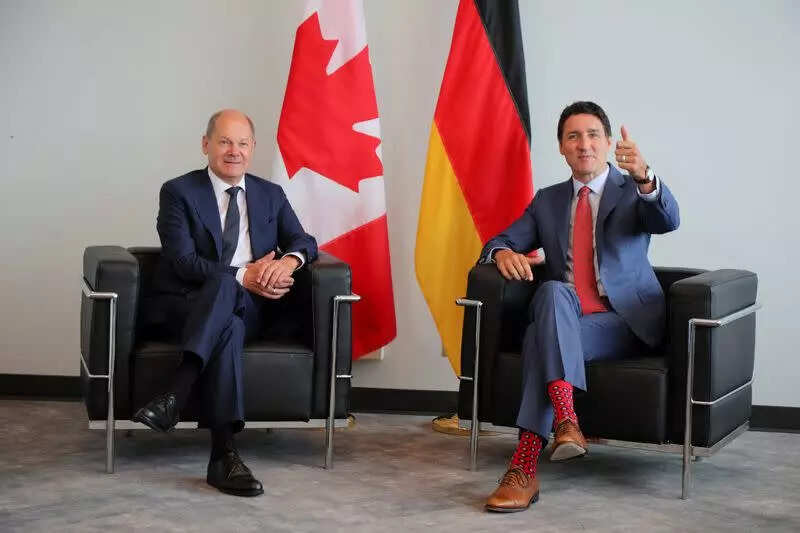
MONTREAL – Russia’s invasion of Ukraine is bringing Canada and Germany closer together, with Canada seeking to boost energy and critical mineral exports to Germany as both countries wean themselves off fossil fuels, Canadian and German leaders said on Monday.
German Chancellor Olaf Scholz met with Canadian Prime Minister Justin Trudeau on Monday morning during a three-day visit with a delegation of German company executives in tow. The two spoke to reporters afterward with the Montreal skyline behind them.
The two countries are expected to announce on Tuesday agreements for Canada to accelerate hydrogen and critical minerals exports to Germany.
Germany fears a further reduction of natural gas supplies from Russia this winter in retaliation for Western sanctions following the invasion of Ukraine in February, Economy Minister Robert Habeck told German broadcaster ARD on Monday. Russia calls its actions in Ukraine “a special military operation.”
“What Russia’s decision to invade Ukraine has done is accelerated and deepened the approach that we have towards each other,” Trudeau said.
While Trudeau left the door open to new projects to export liquefied natural gas (LNG) to Europe from Canada’s Atlantic coast, he emphasized the economic difficulties of those projects and the need to decarbonize the global energy supply.
Canadian companies are exploring ways “to see if it makes sense to export LNG and if there’s a business case for it to export LNG directly to Europe,” Trudeau said.
Scholz said while Germany needs to procure gas elsewhere so it is not dependent on Russian supplies, the country also is aiming to reach zero carbon emissions by 2045.
Canada wants to decarbonize fully by 2050. By mid-2024, Germany hopes to eliminate its need for Russian gas.
“If Germany is one of the countries asking for natural gas, for LNG, it is also a country… that is on the direct way to transform its own economy” away from fossil fuels, Scholz said.
Canada was the world’s fifth-biggest producer of natural gas in 2020, according to the International Energy Agency, but currently has no LNG facilities on the East Coast and no way to bring gas to them without expanding pipelines.
Trudeau said his government was willing to ease “regulatory hurdles” for any new LNG projects should companies decide there is a worthwhile business case to construct them.
But last week Canada’s Natural Resources Minister Jonathan Wilkinson played down the prospects for new LNG projects, saying in an interview that producing clean hydrogen is “the big opportunity” for Canada.
ELECTRIC VEHICLES
Canada will ban the sale of new fuel-burning cars and light-duty trucks from 2035, in line with the European Union target, and is seeking to develop its critical-mineral resources and attract electric vehicle (EV) battery and car makers.
On Tuesday, Canada will ink Memorandums of Understanding (MOU) with Volkswagen, a Canadian government source said, and with Mercedes-Benz Group AG, according to sources in Canada and Germany, to develop supply chains for critical minerals like nickel, lithium and cobalt that are used in EVs.
The MOUs “will show the partnership that these two companies see in Canada,” the Canadian source said. “The companies will be moving along in partnerships, and signings and things like that with Canadian companies in the very, very near future.”
Canadian Industry Minister Francois-Philippe Champagne laid the ground work with carmakers during a visit to Germany in May, the source said.
State Secretary for Economic Affairs Franziska Brantner, who is traveling with the German delegation, told Reuters on Monday the German car industry could invest in lithium processed in Canada immediately.
“Canada has almost all the raw materials that Russia has – but it is democratic, offers reliable legal frameworks,” Brantner said.